Maintaining a sense of calm and focus can be challenging in hectic daily life. That's where The Absorption Company's Calm supplement steps in, offering a comprehensive formula that combines scientifically backed ingredients to support relaxation, mental clarity, and overall well-being.
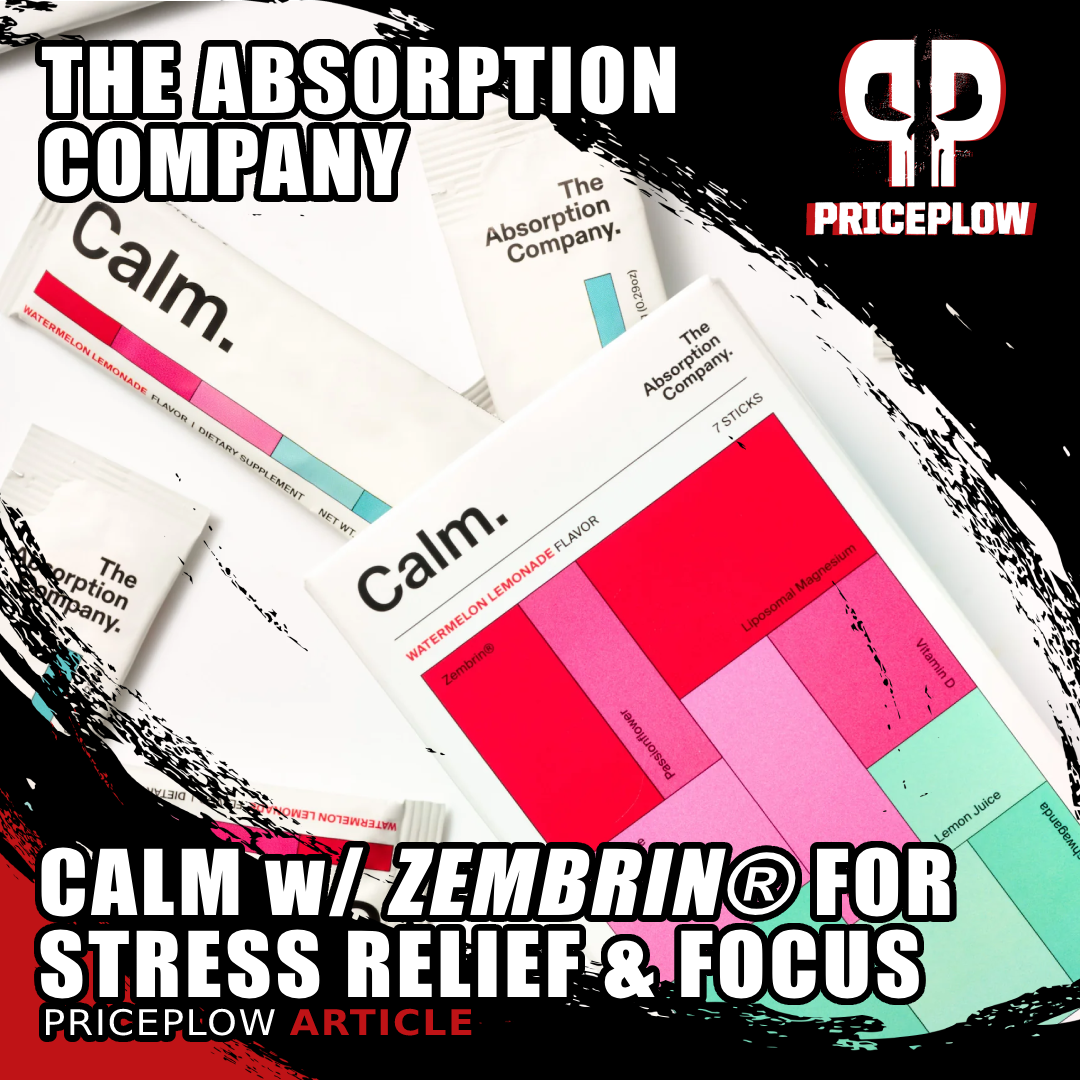
The Absorption Company's Calm offers a well-rounded formula to help with relaxation, clarity, and stress relief. With Zembrin® at the core, it's packed with clinically-backed ingredients to keep you balanced.
If you haven't heard of The Absorption Company, it's a company started by actress Nikki Reed, promising 3rd-party tested, glyphosate-free, gluten-free and non-GMO supplements with enhanced absorption technology.
Calm features a thoughtful blend of adaptogens and botanicals, including the well-known Zembrin® from PLT Health Solutions, which is the world's most well-studied Kanna extract known for its clinically-verified mood-enhancing and cognitive benefits.
But it doesn't stop there. The formula also includes ashwagandha for stress relief, L-theanine for relaxation without drowsiness, and several other promising ingredients that work together to help you stay balanced and focused throughout the day.
In the rest of this article, we'll provide a full scientific breakdown of each ingredient in Calm to help you see how its effects could fit into your daily life. Stick around for all the details, but first, sign up for our PLT Health news alerts so you can stay up to date on Zembrin:
The Absorption Company Calm – Deals and Price Drop Alerts
Get Price Alerts
No spam, no scams.
Disclosure: PricePlow relies on pricing from stores with which we have a business relationship. We work hard to keep pricing current, but you may find a better offer.
Posts are sponsored in part by the retailers and/or brands listed on this page.
This area is reserved for Team PricePlow's upcoming videos.
Subscribe to our channel and sign up for notifications so you catch it when it goes live!
Ingredients in The Absorption Company Calm
The ingredients in The Absorption Company's Calm are:
-
Zembrin® (sceletium tortuosum aerial parts extract) - 25 mg
Zembrin® is a unique, patented extract produced by PLT Health Solutions. It's derived from the aerial parts of Sceletium tortuosum, a plant commonly known as Kanna. This botanical has been used in traditional South African medicine for centuries. Indigenous tribes used to chew on its leaves during high-stress activities like hunting to stave off fatigue and elevate their mood.[1,2]
Today, Zembrin offers much more than just a historical anecdote — it's the most well-researched Kanna extractsavailable, with modern science showing it can significantly improve mood, reduce stress, and enhance cognitive function -- all at this 25 milligram dose!
So, how exactly does Zembrin work? It starts with its rich alkaloid profile, specifically the mesembrine alkaloids, which are believed to drive its powerful effects on mood and cognition.
Research has shown that Zembrin targets two crucial mechanisms in the brain: serotonin reuptake inhibition and phosphodiesterase-4 (PDE-4) inhibition.[3,4] Let's start by breaking that down.
How Zembrin Affects Serotonin and PDE-4
Serotonin reuptake inhibition is a mechanism utilized in many mood-enhancing applications. It increases the availability of serotonin in the brain, a neurotransmitter that plays a vital role in mood regulation.[5] By making more serotonin available, Zembrin can help improve mood and reduce anxiety. It's almost like giving your brain a little boost of emotional stability.
On the flip side, PDE-4 inhibition is more about boosting cognitive performance. This mechanism increases levels of cyclic adenosine monophosphate (cAMP), a molecule that helps with brain communication and neuroplasticity.[6] In simpler terms, Zembrin enhances the brain's ability to learn, adapt, and process information quickly.[7,8]
This dual-action mechanism is what makes Zembrin so special. It helps you feel better emotionally and supports sharper mental performance.
Relevant Research on Zembrin
The benefits of Zembrin aren't just theoretical -- they've been demonstrated in several clinical studies. In one functional MRI (fMRI) study, participants who took Zembrin showed a significant reduction in activity in the amygdala, the brain region responsible for processing fear and anxiety.[9]
Treatment with Zembrin significantly improved soreness, and range of motion (ROM) 48 hours post-exercise.[10]
This suggests that Zembrin can help reduce exaggerated fear responses, promoting a calmer, more focused state of mind. Imagine feeling a little more cool, calm, and collected even in high-pressure situations like an intense workout or while participating in a high-level competition.
There's only one patented, standardized, and clinically-studied kanna extract on the market: Zembrin from PLT Health Solutions.
But it doesn't stop there. Zembrin has also shown promise in enhancing cognitive flexibility and executive function, which are essential for problem-solving, planning, and adapting to new challenges.[1] This is particularly useful for anyone who needs to maintain peak mental performance under stress, whether you're an athlete, a busy professional, or a student facing a demanding schedule.
In a 2024 study, cognitively healthy adults who took Zembrin for three weeks experienced significant improvements in these higher-level cognitive processes compared to those who took a placebo.[1]
Moreover, Zembrin offers these benefits without the jitters or drowsiness that often come with other mood-enhancing or cognitive supplements. We discussed this aspect in Episode #146 of the PricePlow Podcast with PLT Health's Dr. Jeremy Appleton and Steve Fink. This balance of calmness without cognitive impairment makes it an ideal choice for anyone looking to stay focused and emotionally stable throughout the day.
For a more detailed analysis at Zembrin, see our in-depth article, "Zembrin: The Best-Studied Kanna Extract on the Market, by PLT Health Solutions".
-
Sensoril® Ashwagandha (leaf and root extract) - 250 mg
Sensoril® ashwagandha is a standardized extract derived from the Withania somnifera plant. This adaptogenic herb has a long history of use in Ayurvedic medicine for managing stress and promoting overall well-being.
Sensoril is unique because it utilizes both root and leaf extracts, making it a full-spectrum product that maximizes the presence of beneficial compounds like withanolides, withaferin, and oligosaccharides. Numerous clinical studies have highlighted ashwagandha's benefits, especially its role in reducing stress and anxiety.
One notable double-blind, placebo-controlled trial involving 130 chronically stressed adults demonstrated significant reductions in cortisol levels, a key stress hormone, after 60 days of supplementation with ashwagandha. Compared to the placebo group, participants experienced reduced fatigue, anxiety, irritability, and improved mood and concentration.[11]
Another study focused on cognitive function showed that ashwagandha supports stress management and enhances cognitive performance. Participants who took ashwagandha for 8 weeks significantly improved reaction time, working memory, and cognitive capacity.[12] This makes Sensoril a valuable supplement for those seeking both mental clarity and emotional stability.
In addition to stress relief and cognitive support, ashwagandha has been shown to improve physical performance and recovery.
Research has found that ashwagandha helps reduce the negative impact of chronic stress on the hypothalamic-pituitary-adrenal (HPA) axis, a critical system involved in stress response. By modulating this axis, ashwagandha can help restore balance and reduce the long-term health impacts of stress, such as anxiety, depression, and sleep disturbances.[13] This, in turn, helps you recover better when you're training hard and trying to maximize performance.
Additionally, a recent meta-analysis from 2021 found that ashwagandha has the potential to improve physical performance. The analysis showed positive results in enhancing muscle strength, boosting VO2 max for better endurance, and aiding recovery by reducing fatigue and muscle soreness.[14]
Overall, whether you want to perform your best in the gym or in your everyday life, having Sensoril in The Absorption Company's Calm is a great addition to help manage stress and mental balance.
-
L-Theanine - 250 mg
L-theanine is a naturally occurring amino acid found in tea leaves. It's known for its ability to promote relaxation without causing drowsiness -- and this is a large dose of it!
L-theanine works by enhancing levels of the neurotransmitters GABA, dopamine, and serotonin in the brain.[15] Each of these neurotransmitters plays a role in regulating mood and promoting a sense of calm. Therefore, increasing their levels helps reduce stress and anxiety, making it easier to handle hectic moments during the day or even take on some intense athletic training with a calm and focused mind.
L-theanine can be even more effective because it has the potential to increase alpha brain wave activity, which is linked to a state of relaxed alertness.[16] This characteristic makes L-theanine a great option for individuals looking to unwind or improve focus without feeling sedated or sluggish.
Moreover, it has neuroprotective properties, which can support cognitive function and mental clarity, further enhancing its role as a calming agent.[17]
Beyond its mental health benefits, L-theanine has been studied for its positive impact on physical health, particularly in reducing heart rate and blood pressure in stressful situations.[18] This makes it a valuable ingredient for overall cardiovascular health and stress management.
Lastly, its ability to modulate the immune system and exert antioxidant effects contributes to its holistic health benefits, supporting the body's resilience against stress and improving overall well-being.[19]
At 250 milligrams here, Nikki and her team have put in a dose that should be felt -- this is far greater than the doses we generally see from 50 to 200 milligrams!
-
CherryPURE® (tart cherry powder(skin) anthocyanin) - 200 mg
CherryPURE® is a patented tart cherry powder made from the skin of Montmorency cherries, standardized for high levels of anthocyanins. Its most prominent benefits in Calm are the potential to reduce inflammation and promote recovery.
Tart cherries have been widely researched for their potential to aid in muscle recovery and reduce exercise-induced muscle soreness.
Studies show that the anthocyanins in tart cherries, which give them their vibrant red color, possess strong antioxidant and anti-inflammatory properties.[20] These compounds help reduce oxidative stress and inflammation, which are often elevated after intense physical activity.
In a study in 2010, runners who consumed tart cherry juice experienced significantly less muscle pain and quicker recovery than those who took a placebo.[21]
Beyond its benefits for athletes, tart cherry powder may also support sleep quality. Tart cherries are a natural source of melatonin, a hormone that regulates sleep-wake cycles. Research suggests that consuming tart cherry products can increase sleep time and efficiency, making it easier to fall asleep and stay asleep longer.[22]
Additionally, the high antioxidant content in tart cherries may support cardiovascular health by improving blood vessel function and reducing blood pressure.[23]
-
Sabroxy® (Oroxylum indicum Bark) Extract (10% Oroxylin A) - 150 mg
Sabroxy® is a unique extract derived from the bark of the Oroxylum indicum tree, standardized to contain 10% Oroxylin A, a potent flavonoid. Its potential for cognitive enhancement and neuroprotective properties make it a promising addition to Calm.
One of the primary mechanisms of action for Oroxylin A is that it increases the levels of the brain-derived neurotrophic factor (BDNF).[24] BDNF is crucial for neuroplasticity, the brain's ability to reorganize and form new neural connections, which is essential for learning and memory.
In animal studies, Oroxylin A has been shown to improve memory retention and cognitive performance, indicating its potential as a nootropic compound.[25]
Additionally, research indicates that Oroxylin A may act as a dopamine reuptake inhibitor.[26] This means it can increase dopamine levels in the brain. Higher dopamine levels can enhance mood, motivation, and alertness without the jittery effects commonly associated with stimulants.
That increased dopamine is great when you want to keep your mind calm and clear during intense mental activities or even intense exercise.
Oroxylin A also exhibits anti-inflammatory and antioxidant properties, which help protect neurons from oxidative damage and inflammation.[26] Those factors are often linked to neurodegenerative conditions. This protective effect on brain cells further highlights its role in supporting overall cognitive health.
Overall, while early studies show great potential for Oroxylin A to improve cognitive function and health, more research, especially on humans, is needed to confirm its effects. That said, it's still a very promising addition to a supplement like Calm.
-
Capsoil® Passionflower Oil - 50 mg
Capsoil® Passionflower Oil is derived from the Passiflora incarnata plant. It has a long history of use in traditional medicine for its calming and anxiety-reducing effects. This botanical is known for its bioactive compounds, including flavonoids like vitexin and isovitexin, which have anxiety-reducing properties.[27]
Studies have shown that passionflower has the potential to reduce symptoms of anxiety and improve sleep quality.
One randomized controlled trial found that passionflower was as effective as oxazepam, a common anti-anxiety medication, in reducing anxiety. Plus, it didn't cause the side effects typically associated with pharmaceuticals, like drowsiness or cognitive impairment.[28] This makes it an attractive natural option when you want to manage stress and anxiety without sedation.
Moreover, passionflower has been found to influence GABA (gamma-aminobutyric acid) levels in the brain.[29] GABA is a neurotransmitter that helps inhibit neural activity, promoting relaxation and reducing the overstimulation that can lead to anxiety. Increased GABA activity is associated with a calming effect on the nervous system, making passionflower a promising addition to supplements like Calm for stress relief and improved mental well-being.
-
Capsoil® Liposomal Saffron - 10 mg
Capsoil® Liposomal Saffron harnesses the unique properties of saffron (Crocus sativus) for mood enhancement and stress reduction. Saffron has been used for centuries in traditional medicine, and recent studies have shown it could have many benefits for mood regulation and cognitive health.
One of the active components in saffron, crocin, has been shown to influence serotonin levels in the brain, which can help alleviate symptoms of anxiety and depression.[30]
A 2013 meta-analysis found that saffron supplementation was as effective as conventional antidepressants for treating mild to moderate depression. Plus, it didn't show the side effects associated with pharmaceutical treatments.[31]
A meta-analysis from 2022 also showed that saffron extract had positive effects on mood and reduced anxiety in adults experiencing stress.[32]
Additionally, saffron's antioxidant properties contribute to its neuroprotective effects, potentially improving cognitive function and memory. A study in 2020 highlighted that saffron supplementation could enhance cognitive performance and reduce the cognitive decline associated with aging. The research even showed that it had similar effects as prescription anti-Alzheimer's drugs.[33]
-
Magnesium (from 230 mg of Capsoil® Liposomal Magnesium Bisglycinate powder) - 30 mg (7% DV)
Magnesium bisglycinate is a form of magnesium chelated with glycine, which enhances its bioavailability and minimizes the potential for gastrointestinal discomfort, a common issue with other forms of magnesium.[34]
Magnesium plays a key role in numerous physiological functions, including muscle and nerve function, energy production, and mood regulation.[35]
Dive into PLT Health's cognitive platform with Steve Fink and Dr. Jeremy Appleton, exploring Zynamite, Zembrin, and Vanizem's impact on brain health in Episode #146 of the PricePlow Podcast
Additionally, studies have shown that magnesium supplementation can help reduce symptoms of anxiety and improve sleep quality.
A meta-analysis in 2020 showed that magnesium supplementation can help reduce mild anxiety and stress in adults.[36] This is likely due to magnesium's role in regulating neurotransmitters and the HPA (hypothalamic-pituitary-adrenal) axis, which is responsible for the body's stress response.
This isn't a massive dose, but it's not a tiny one either. We'll definitely recommend more magnesium throughout the day, but we'll never say no to a solid 7% DV from 30 milligrams.
-
Vitamin D (as cholecalciferol) - 37.5 mcg (1,500 IU)
Zembrin® delivers an alert serenity that impacts mood, focus, and an overall sense of well-being. It's been clinically shown to deliver its benefits at a very low dose and can enhance cognitive function as soon as two hours.
Vitamin D is crucial for overall health, playing a key role in bone health, immune function, and mood regulation. The 1500IU dosage of cholecalciferol is meant to support increased blood levels.
Research has shown that Vitamin D receptors are present in the brain, suggesting a significant role in mental health.[37] A study in 2022 found that low levels of Vitamin D were associated with an increased risk of depression and anxiety, highlighting its importance in mood regulation.[38]
The question is whether supplementing it can help with mood (we greatly prefer sunshine and UV light when possible). The good news is that a meta-analysis of 18 randomized placebo-controlled trials in 2023 suggested that supplementation with Vitamin D can improve depressive symptoms, especially in those with deficiency.[39]
Conclusion: Nikki Reed Knocks it Out of the Park with Calm
Overall, The Absorption Company's Calm is a thoughtfully crafted supplement designed to support relaxation, stress relief, and cognitive clarity.
At the heart of this formula is Zembrin®, a well-researched ingredient known for its ability to enhance mood and reduce anxiety. Combined with other powerful ingredients like Sensoril® ashwagandha, L-theanine, and Capsoil® liposomal saffron, Calm offers a holistic approach to maintaining mental and emotional balance.
After thoroughly reviewing the ingredients, we can say it's a great option for staying focused during a busy day, managing stress, or even preparing to tackle some intense training. We recommend you give it a try if you're looking to add a little more calm into your life.
The Absorption Company Calm – Deals and Price Drop Alerts
Get Price Alerts
No spam, no scams.
Disclosure: PricePlow relies on pricing from stores with which we have a business relationship. We work hard to keep pricing current, but you may find a better offer.
Posts are sponsored in part by the retailers and/or brands listed on this page.
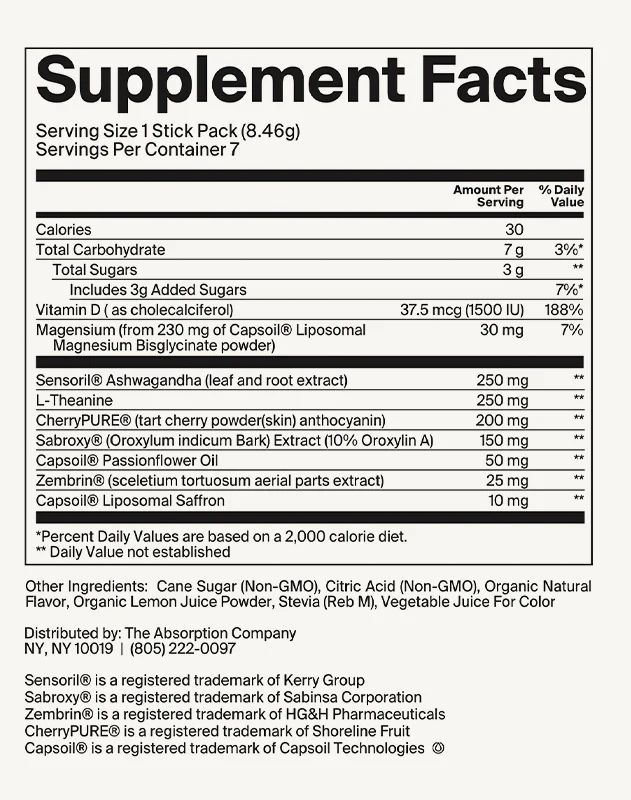
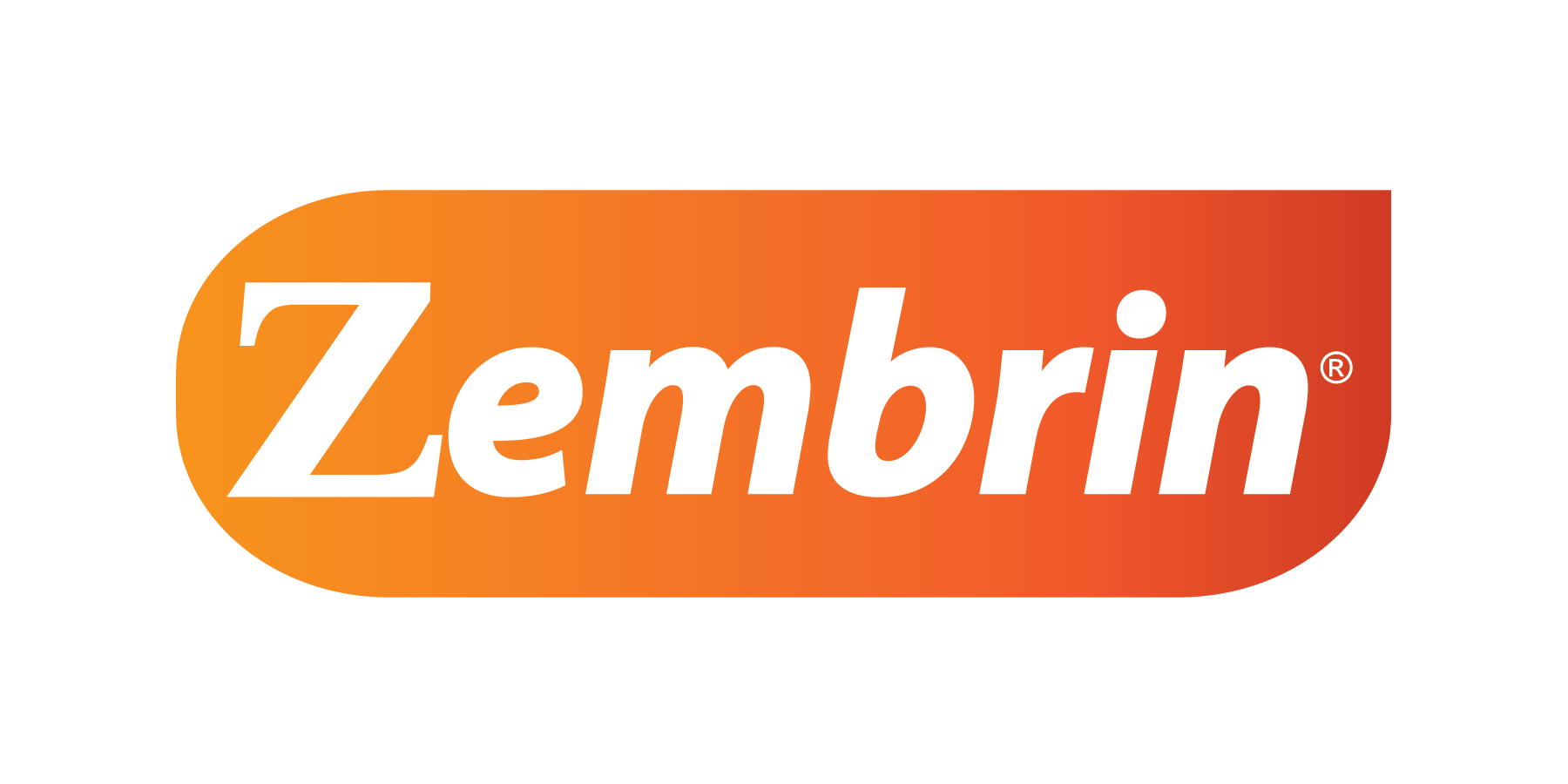
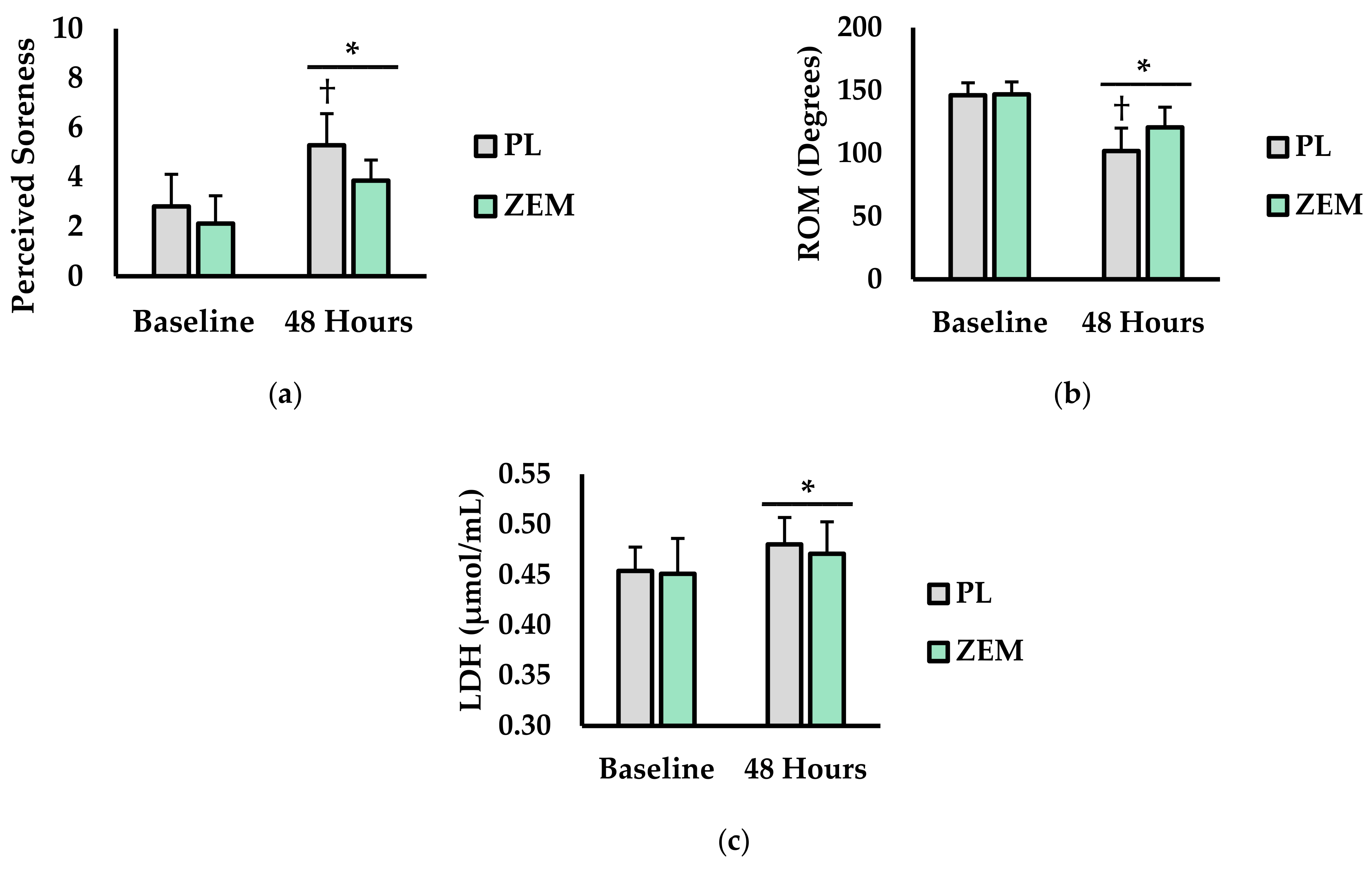
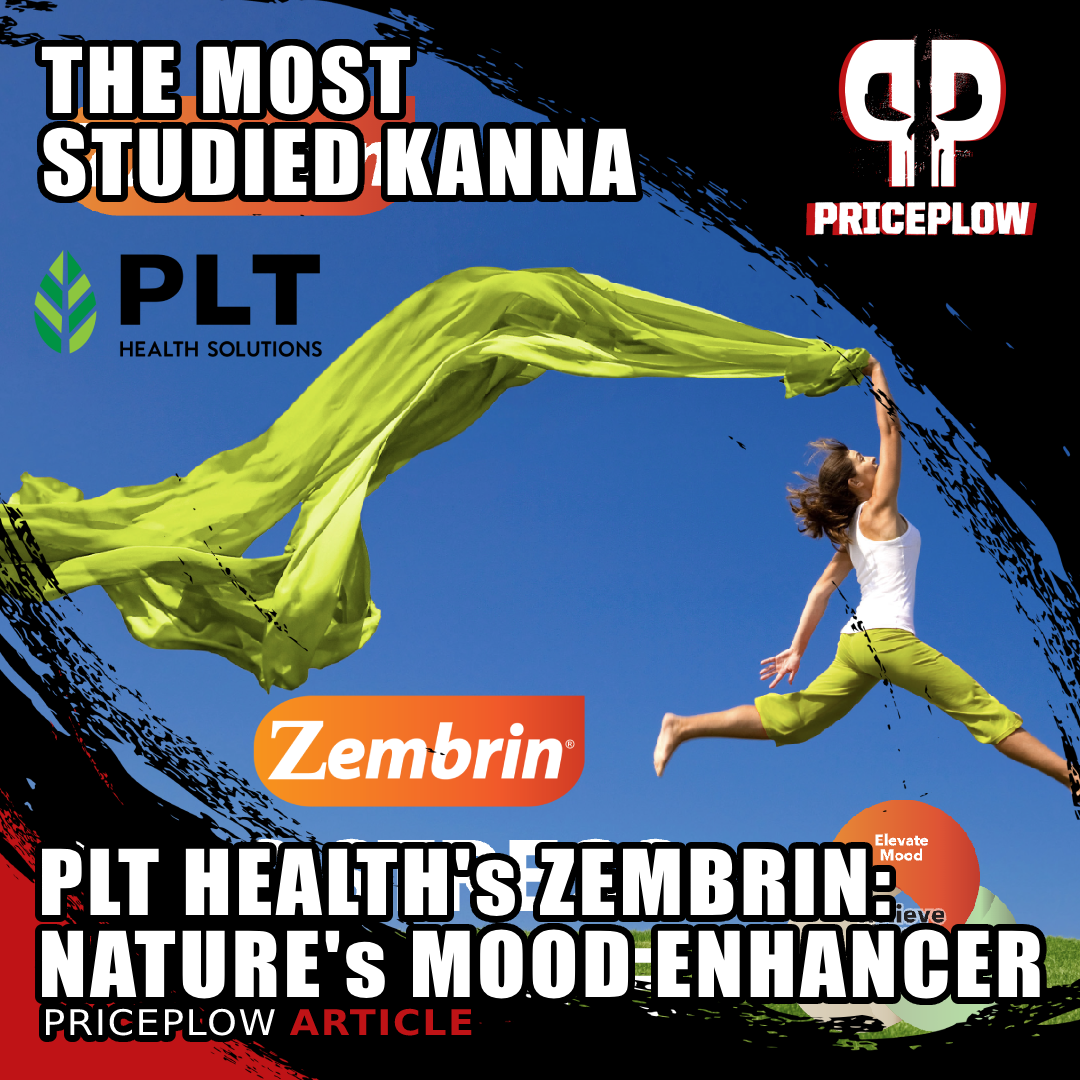

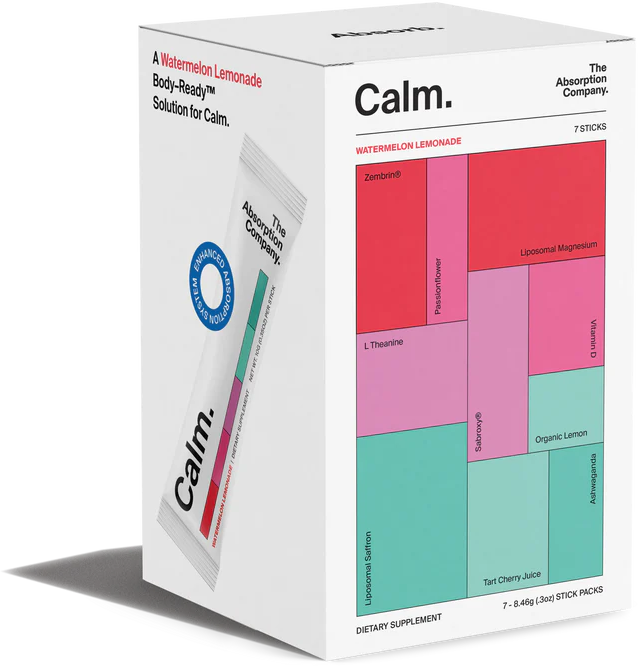


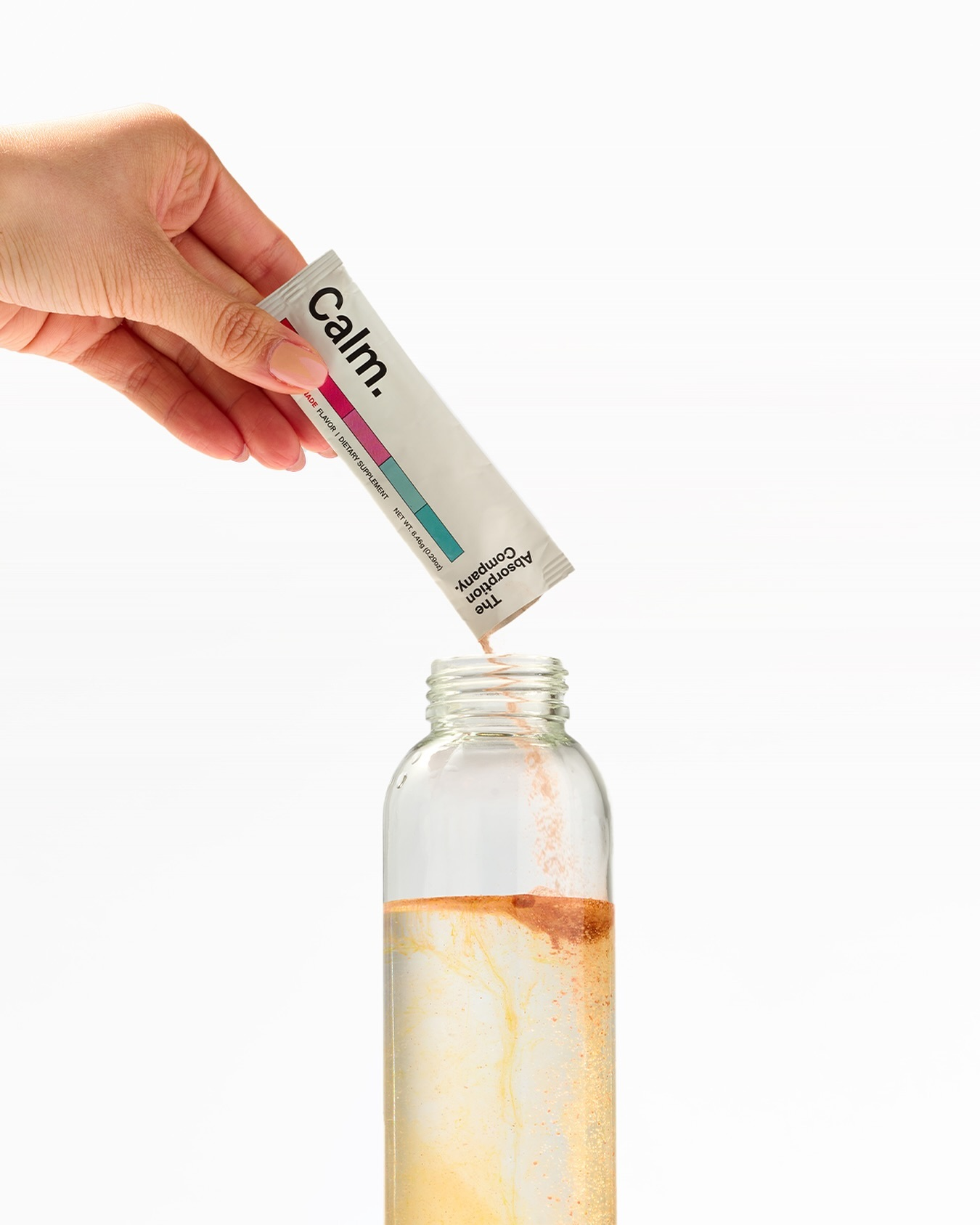
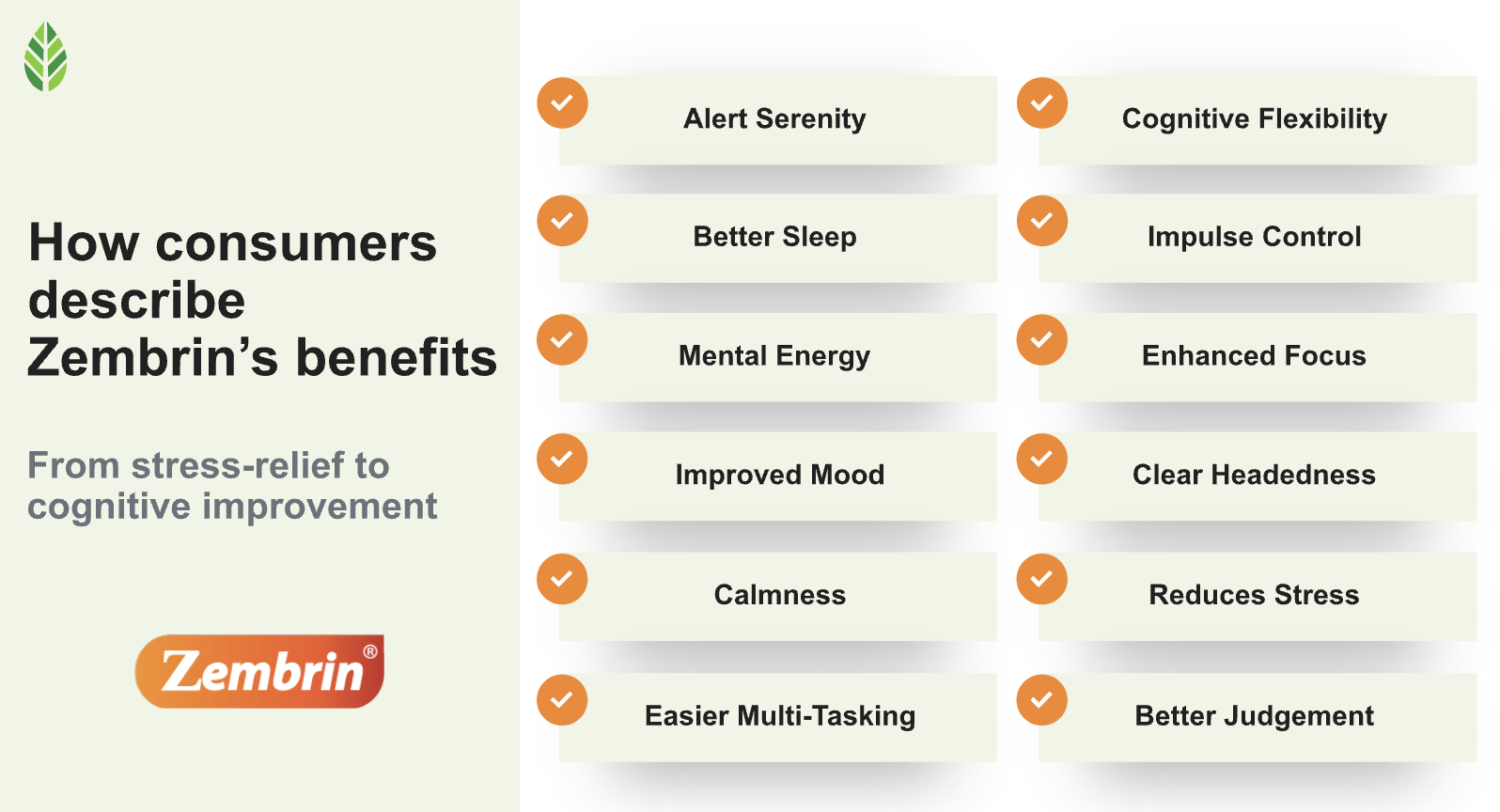
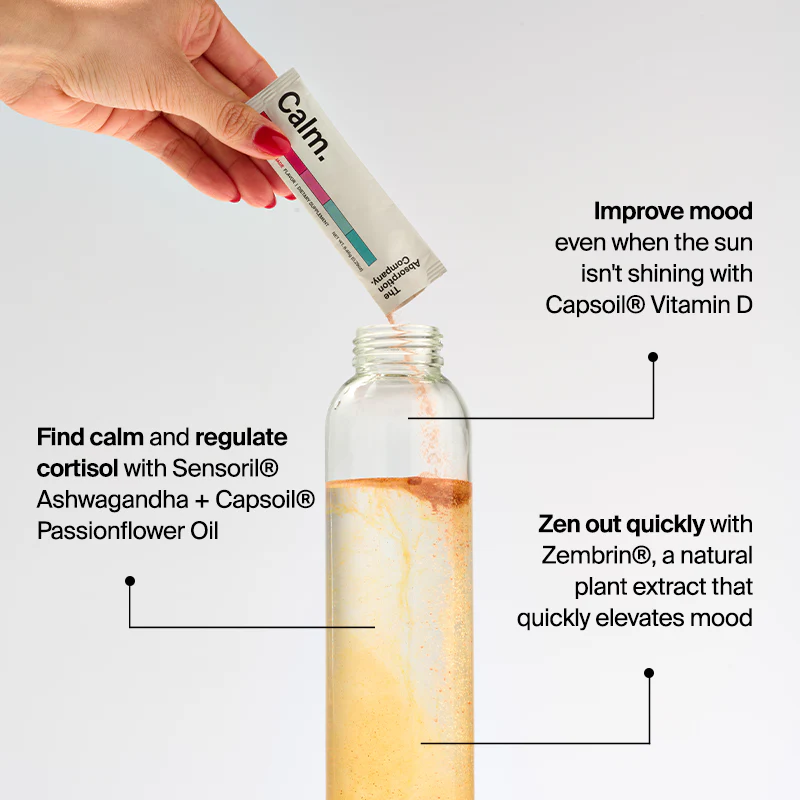
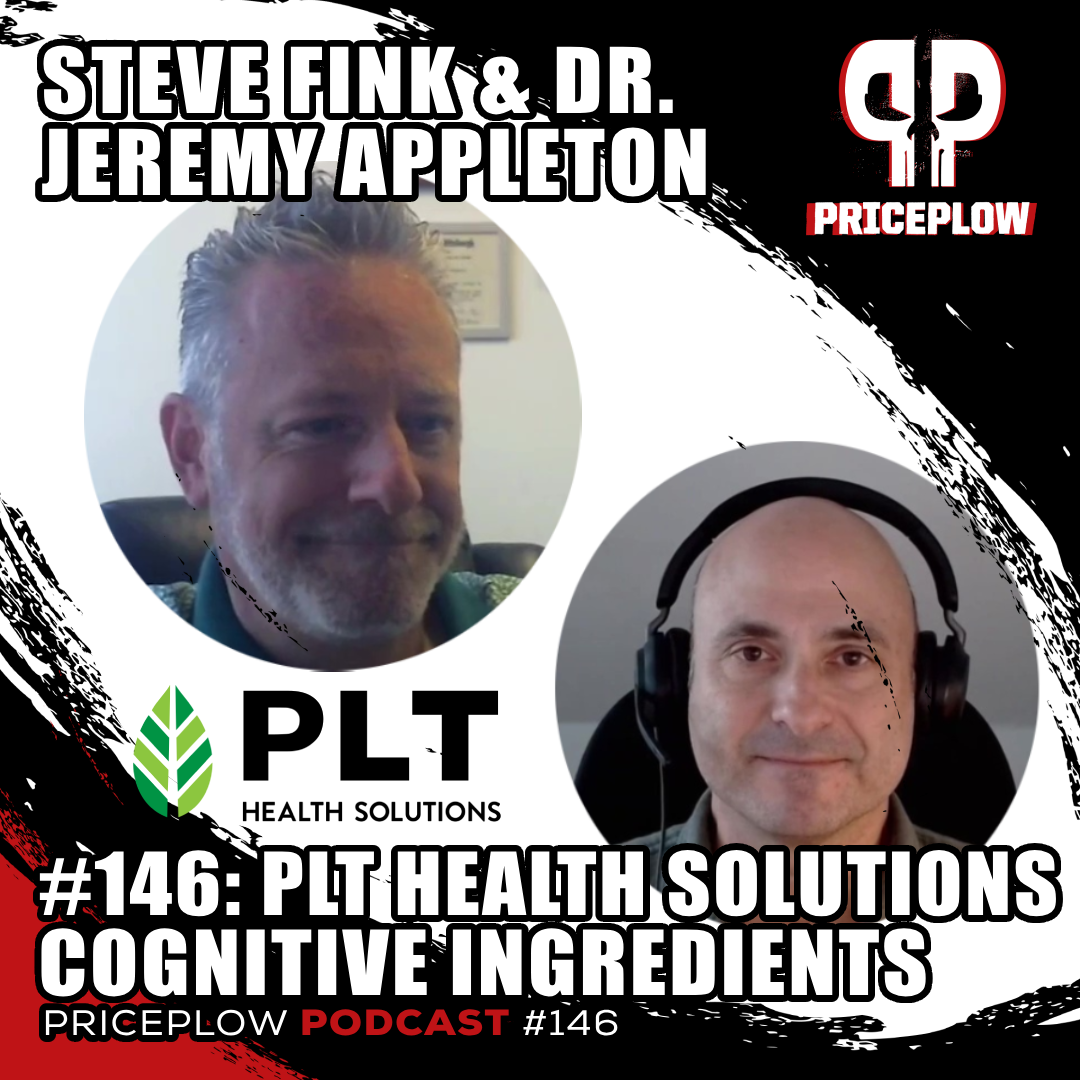
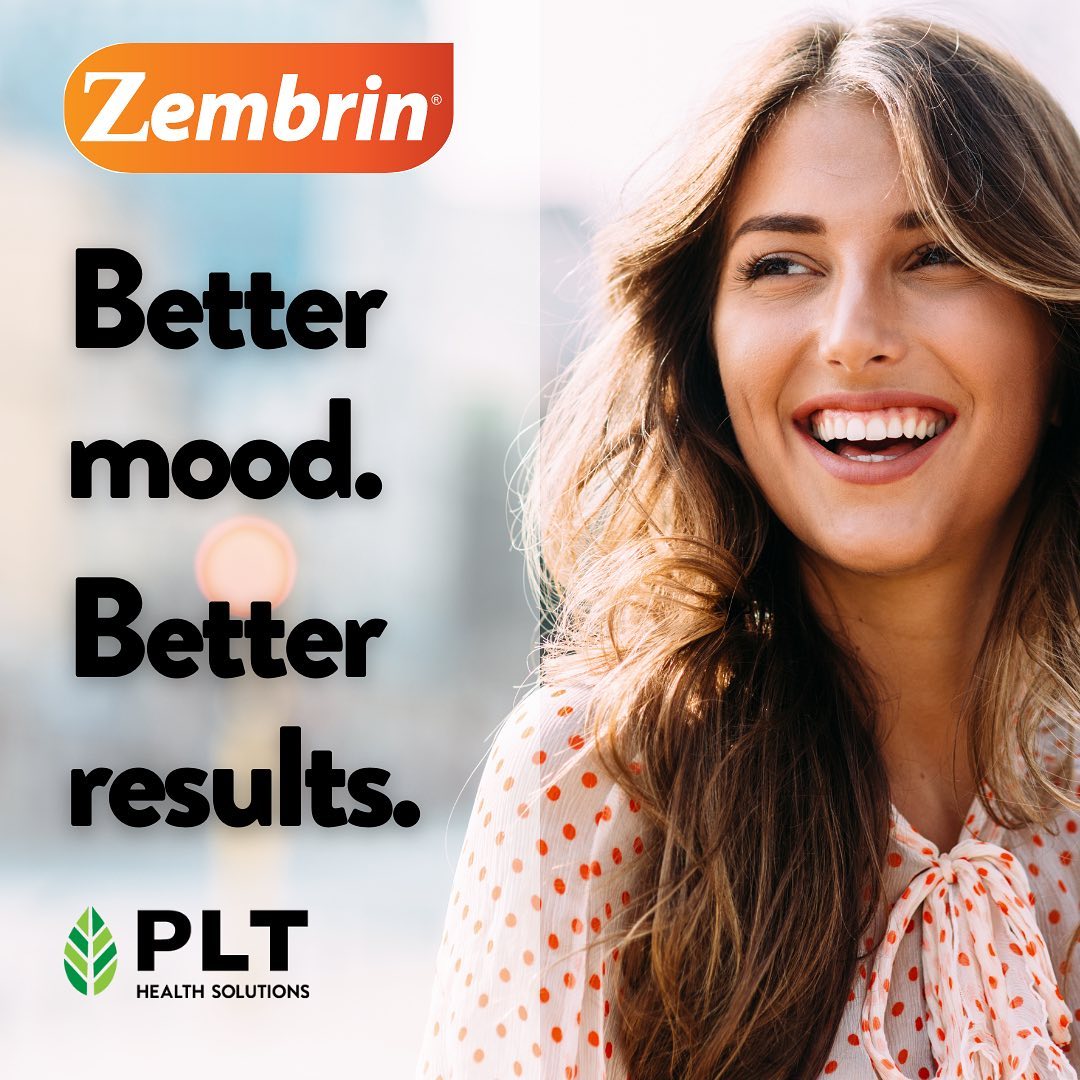



Comments and Discussion (Powered by the PricePlow Forum)